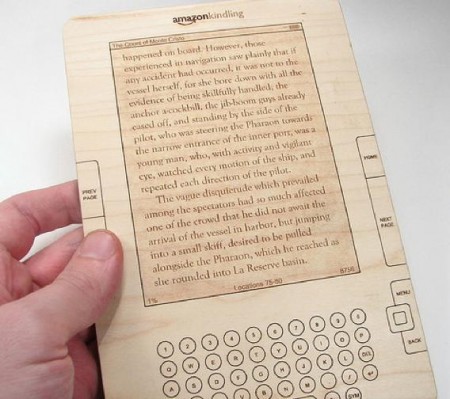I Finally Got a Kindle and I Love It but I Am Scared of Fascism

You know the panicky, paranoid manner in which the Tea Partiers appear to cling to their guns and religion, as if someone really were trying to take them away? For some of us, the same condition of ongoing nerves regarding the encroaching powers of the State comes instead from a V for Vendetta- or Fahrenheit 451-type terror of the State coming after our books. Various States have indeed come after all of these assets, from time to time, so it’s not like any of us is entirely making this stuff up. At this very moment they don’t let Chinese people or Cubans or Belarusians or many, many others all over this world read whatever they want, watch whatever movies they want, or have all the guns and/or religion they want.
So if there is to be a fear of the increasing adoption of e-readers such as the Amazon Kindle, B&N; Nook and iPad, that is by far the scariest thing about it, because if you were to keep all your books on such a device, some villain really could come along one day and pretty much flip the switch and take all your books away — and not just yours but everyone’s, all at once. What if we had some kind of latter-day Dick Cheney deciding to take action against the despicable, dangerous pointy-heads? Boom! Nothing left to read but George W. Bush’s memoirs.
Nick Negroponte has been going around saying that physical books will be mass-produced for only maybe another five years. His reasoning is opaque, I must say, and appears to have something to do with the fact that books are hard to send to Africa. I hope he realizes that printed books are, in effect, a guarantee of civil liberties, and that we will continue to need them.
Anyways. Despite all these speculative-fiction-induced terrors, my husband gave me a Kindle for my birthday some weeks ago and I love it SO MUCH, no matter what Joan Didion says. Thousands and thousands of books fit on this pretty, if potentially sinister, little machine. I just go over to Project Gutenberg and vacuum stuff up like the textual whale that I am, because I have no literary discernment whatsoever and will gladly spend the afternoon reading Agatha Christie or really, literally, almost anything. Project Gutenberg is now up to 33,000 free e-books, all out-of-copyright and so classics mostly; almost all of them are available in .mobi format, which looks fantastic on the Kindle. You don’t have to feel the least bit guilty as you might even at a thrift shop, where whatever you buy, it is all going to take up room on bookshelves that you know you do not have; these books take up no extra room whatsoever, and you can just delete them when you are done!

I bet you will be surprised to hear when Project Gutenberg first started. 1971 (!) is the true answer, and could they ever destroy every Final Jeopardy contestant with that one, I bet. Project Gutenberg’s founder, Michael Hart, is a most unusual and interesting man: the ultimate anti-corporatist. Like Yoda, Mr. Hart doesn’t appear to possess much glamour or power on the outside, but he is bursting with such things on the inside. He doesn’t care two pins about money, hasn’t had a salary for years and acquires the few bits of stuff he seems to need at garage sales.
In the 1970s, nobody really had a clue that computers would come to be used for the mass storage of valuable information. It simply hadn’t occurred to anyone yet that the computer would be useful for anything but, well, computation. It was so shockingly, incredibly good at that! There was such a lot of computation that needed to be done; computation was first in line.
Now it emerges that whoever controls the storage effectively will effectively control the media commons. There are a lot of champions in this fight, but Michael Hart saw it all coming decades ago, and started typing his fool head off, dozens and dozens of whole books, long before OCR was a gleam in a programmer’s eye. Hart has done more to secure the future of the public domain than anyone else in the world, I believe. These widely distributed books cannot be taken away; when they’re downloaded and stored on private devices and media, it’s like insurance for Western Civ.
My first few times on Project Gutenberg I downloaded a lot of quite rare early Wodehouse (highly recommended: The Swoop! or, How Clarence Saved England) and also a lot of Thackeray, Gibbon, pretty much all of Mrs. Gaskell and, just by accident, Émile Gaboriau’s La Vie Infernale — the fruitiest, most marvelous 19th-c. French melodrama (in two parts: The Count’s Millions and Baron Trigault’s Vengeance. I just love that guy. Plus Shakespeare and the King James Bible and that sort of stuff.
The only book I’ve bought for the Kindle so far is Infinite Jest, which is far and away my favorite modern novel. A few days later, I was having a little dispute with my husband over whether or not Wallace misuses the word “ilk” in that book, which with the Kindle’s search feature took about twenty seconds to settle (A: not really; it appears just once, in the quoted speech of Madame Psychosis.) It’s all thrillingly searchable, and browsable, plus once you get a book on your Kindle (or Nook, or equiv.) you can highlight things and also make your own notes anywhere you like.
Whoever wonders whether one will buy fewer real books because one has got an e-reader, I can tell you that the answer is alas no, not necessarily. One may quite easily wind up buying more books, if anything, because the getting of books is on one’s mind more.
So all that is the upside of having a Kindle.
On the other hand, my Fahrenheit-451-paranoia was fanned into a giant flaming ball of fear-napalm when I looked into the personal ownership of my own Kindle e-books and files, as one should.
In July of 2009, you may remember, Amazon came stealthily along and deleted e-copies of 1984 (no seriously, they did) and Animal Farm from people’s Kindles — copies they’d already paid for and downloaded — because it turned out that there was a rights problem with the e-publisher. Jeff Bezos wound up apologizing all over himself and taking it all back and promising never to do that ever again, but the fact remains that Amazon has some kind of access to your Kindle files and can literally remove them, if they feel like it, which is downright creepy, and if it were your computer you would not like it one little bit.
Indeed, Amazon can semi-brick your Kindle if they decide you’ve been abusing their service, say by returning too much stuff. And I bet they could brick the whole thing, if they really wanted to. I don’t imagine many of us care for the idea of some corporation having that kind of control over our personal libraries.
Having learned all this, I went along and had a closer look at the current Kindle License Agreement. There is some simply petrifying stuff on there. For starters, you don’t “own” Kindle books, you’re basically renting them.
Unless otherwise specified, Digital Content is licensed, not sold, to you by the Content Provider.
They can change the software on you whenever they like:
Automatic Updates. In order to keep your Software up-to-date, Amazon may automatically provide your Kindle or Other Device with updates/upgrades to the Software.
That is how a totalitarian state would go about confiscating books, if they wanted to. There is nothing in this agreement to stop Amazon from modifying the Kindle software to make it impossible for you to read any of your own files on the device. Such a step is not actually forbidden to them by this agreement; they are under no obligation to protect any data you might be storing on there. That’s not to say that there aren’t laws at least in some states that might allow you to sue for damages; I’m just saying, there isn’t any promise made by Amazon to protect your data or preserve its readability.
They can also change the terms of the deal or simply shut down Kindle service entirely, anytime they like:
Changes to Service. We may modify, suspend, or discontinue the Service, in whole or in part, at any time.
Or they might decide to shut your account down:
Termination. Your rights under this Agreement will automatically terminate if you fail to comply with any term of this Agreement. In case of such termination, you must cease all use of the Software, and Amazon may immediately revoke your access to the Service or to Digital Content without refund of any fees. Amazon’s failure to insist upon or enforce your strict compliance with this Agreement will not constitute a waiver of any of its rights.
Keep in mind these are your books that you bought or collected. Can you imagine a bookseller or publisher asserting rights over the contents of your bookshelves in your house? That’s basically what we’re talking about, here.
Disclaimer of Warranties. USE OF THE SERVICE, KINDLE, KINDLE STORE, DIGITAL CONTENT, AND SOFTWARE IS AT YOUR SOLE RISK.
It might blow up! LOL JK, well, your books might.
Limitation of Liability. [Blah blah blah] THE LAWS OF CERTAIN JURISDICTIONS DO NOT ALLOW THE EXCLUSION OR LIMITATION OF INCIDENTAL OR CONSEQUENTIAL DAMAGES [blah blah] YOU MAY HAVE ADDITIONAL RIGHTS.
I feel I must! I know I must, somehow.
Oh, and this is from their Privacy (HA!) Policy:
Information from Other Sources
Examples of information we receive from other sources include updated delivery and address information from our carriers or other third parties, which we use to correct our records and deliver your next purchase or communication more easily; account information, purchase or redemption information, and page-view information from some merchants with which we operate co-branded businesses or for which we provide technical, fulfillment, advertising, or other services (such as Target.com); search term and search result information from some searches conducted through the Web search features offered by our subsidiaries, Alexa Internet and A9.com; search results and links, including paid listings (such as Sponsored Links); and credit history information from credit bureaus, which we use to help prevent and detect fraud and to offer certain credit or financial services to some customers.
So don’t worry or anything, but Amazon is looking at your credit history, too.
After reading all this, I rang the (excellent, and very polite) Kindle customer service up to learn more, especially about privacy issues. One thing I wanted to know was exactly how much access Amazon has to my private, personal Kindle files (you can put your own files on a Kindle, .txt and .pdf files that you made yourself.) But after being bumped up through a couple of layers of supervisors, I didn’t get very clear answers to my questions. For instance, on the question of Amazon’s remote access to my personal stuff. “We don’t have access to your files,” I was first told. But can you see my personal files? And if you wanted to delete my personal files, as was done with the Orwell books, could you do it? “We don’t do that.”
Yeah, but could you?
Maria Bustillos is the author of Dorkismo: The Macho of the Dork and Act Like a Gentleman, Think Like a Woman.
Photo from Flickr by Windell Oskay.
